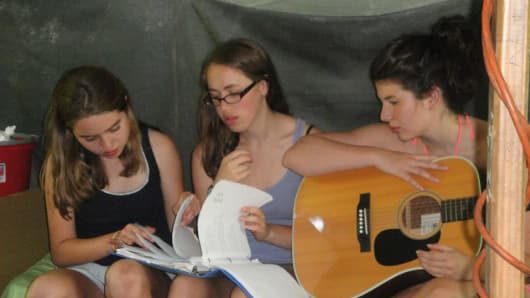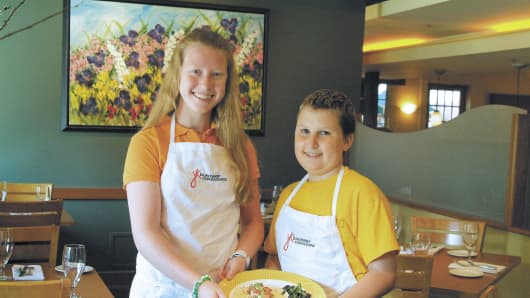How you spend your summer vacation isn't just fodder for first-day-back-in-school essays. It could provide a boost on college or job applications—especially if you went to camp.
Colleges have been getting more selective in recent years. In 2012, the average four-year college accepted 63.9 percent of applicants, down from 69.6 percent in 2003, according to the National Association for College Admission Counseling. Many are even more selective. This year, Yale University accepted just 6.26 percent of applicants, down from 6.27 percent a year ago and 11 percent in 2005, according to educational consulting company IvyWise. Cornell University accepted 14 percent, versus 31 percent in 2005.
Grades and standardized test scores are still the top factor for admission, but educational counselors say colleges are starting to take a harder look at extracurricular activities, particularly those over summer vacation. "Parents assume their kids need to be even more competitive on grades," said Eric Greenberg, founder and director of education consulting firm Greenberg Educational Group. "What has happened, ironically, is the opposite."
To colleges, summertime is like the hiatus between jobs a prospective employer would ask about, said Mark Kantrowitz, senior vice president and publisher at Edvisors Network. "Colleges want to understand, what have you been doing with yourself?" he said. "What happened during that gap?" The answer can be telling of what a student will do on campus.

Parents shouldn't immediately race for the nearest camp sign-up sheet. While there are surely college admissions officers with fond memories of lake swims and archery, the camp experience that is more likely to stand out is a specialized one that speaks to a student's interests, experts say. Summers at soccer camp can help show a would-be college athlete's dedication, for example, while theater camp can be an edge for someone applying to the acting program—especially if the high school's drama program is so-so (or nonexistent).
Focused camps aren't that difficult to find. Half of day camps have some kind of academic activities or areas of study, and one-third offer a STEM (i.e., science, technology, engineering or math) program, according to the American Camp Association.
"By being stronger on the extracurricular activities, you can actually make up somewhat for weaknesses academically," Kantrowitz said. It's no slam dunk, though. "Not everyone is going to yield a benefit, but it's something that distinguishes you," he said. (Considering, however, that some camps can cost upwards of $1,000 per week, it's worth pointing out that extra experience in a student's areas of interest could just as easily come from a summer course at a local college, volunteer experiences or work, he said.)
Steven Infanti, associate vice president for admissions at Harrisburg University of Science and Technology, said a STEM camp experience is something that makes him take a closer look at a student's application. "When I look at an applicant who has a 2.5 [GPA], which would be kind of a borderline admit for us, but I see on his application, I participate in this camp…that shows a lot of initiative and someone who has a passion," he said.
For higher-achievers, relevant camp experience may put them in the running for the university's fellowship program, which pairs 15 incoming freshmen with faculty for research projects, among other advantages.
Colleges may also find longer camp relationships interesting, even if the camp isn't academically focused. "The regular camper who becomes a counselor is a good type of continuity," Greenberg said. That kind of camp experience can indicate positive qualities such as leadership, resilience and good social skills, he said.
That's the kind of story Oberlin College freshman Talia Rodwin expressed in her application essay. Rodwin, 19, has been attending Habon Dror Camp Moshava in Silver Spring, Md., since 2006 and plans to return this summer for her second year as a counselor. (The youth movement camp emphasizes sharing, leadership and communal responsibility.) "I wrote about my camp experiences and community," she said. "I explained how I think of myself as a community builder…and I think that had an impact."

While camp as an application booster isn't a guarantee, it could have other benefits for a college-bound student. Overnight camps can offer a taste of independent living (or at least, living away from mom and dad). The right camp could even help solidify a career path, reducing the chance of a five- or six-year stint at a four-year college while an undeclared student explores options.
"If you go to summer camp and you decide because of the camp that this is what you want to be, you're going to be much more focused as a student," Kantrowitz said.
When he was in middle school, Simon Solis-Cohen, now 23, signed up for a magic camp through Julian Krinsky Camps & Programs in Pennsylvania. He liked it so much that the next year, he tried one of the group's business camps. Then, in the summer leading up to his freshman year of high school, he discovered cooking camp. "It really opened my eyes," Solis-Cohen said.
He was so enamored with cooking that he started working weekends during the school year at the camp chef-instructor's restaurant, then attended college at the Culinary Institute of the America. "I ended up using this as my launching pad," said Solis-Cohen, who is currently with Grgich Hills Estate in Rutherford, Calif., after a stint at renowned Napa Valley restaurant The French Laundry.
As Solis-Cohen discovered, camp can even be a kick-starter for jobs down the line—provided the experience backs up other bona-fides. "Camp is about the social experience of working with other young people in a group setting that's outside your comfort zone," said Chad Oakley, president and chief operating officer of executive search firm Charles Aris, Inc. "That in itself is 50 percent of success in a business environment."
But it's no job shoe-in. "You might get the interview because you went to math camp, but you'd actually get the job because of your ability to interface with people during the interview," said Oakley.
Showcasing a camp experience during the college admissions process can be done in a handful of ways. It might be listed as extra-curricular activities on the college application, or a particularly meaningful experiences worked into the essay portion.
"If you had a transformative experience at the summer camp or a big impact on others, that tells them more about who you are as an individual, especially if you can write about how it set you in a particular direction," Kantrowitz said. "If something is of interest to you, you're more likely to write a passionate essay."
Favorite counselors or camp directors should also be considered for letters of recommendation. "Relatively few students submit letters from outside [school] or that are job-related," said Greenberg. "That can be enormously valuable."




 As the camp director here at Swift Nature Camp, I want to share some valuable insights on how to navigate through the abundance of information available when researching summer camps. Our website and social media platforms are treasure troves of information, showcasing our camp philosophy, diverse programs, exciting activities, and glimpses into the unforgettable experiences we offer. From leadership values to session lengths, photos to blog posts, there's a wealth of details waiting to be explored.
As the camp director here at Swift Nature Camp, I want to share some valuable insights on how to navigate through the abundance of information available when researching summer camps. Our website and social media platforms are treasure troves of information, showcasing our camp philosophy, diverse programs, exciting activities, and glimpses into the unforgettable experiences we offer. From leadership values to session lengths, photos to blog posts, there's a wealth of details waiting to be explored.




 Superheroes are caring - if they didn’t want to ensure the well-being of others, superheroes wouldn’t have anyone to “hero” for. Campers show that they are caring through the sacrifices they make so that a communal living environment can work. Campers console a cabin mate that is homesick or frustrated. Older campers help the younger campers to learn the rules and to succeed at activities and games that they are still learning. Also, the amount of campers that come to the nature center each day to care for the animals there is amazing. They make sure that our camp critters have everything that they need: food, water, the right environment (a clean cage, heating lamps, etc) and of course provide them with lots of attention and love. Our campers are superheroes that care not only for one another, but for all the critters that live with them at camp.
Superheroes are caring - if they didn’t want to ensure the well-being of others, superheroes wouldn’t have anyone to “hero” for. Campers show that they are caring through the sacrifices they make so that a communal living environment can work. Campers console a cabin mate that is homesick or frustrated. Older campers help the younger campers to learn the rules and to succeed at activities and games that they are still learning. Also, the amount of campers that come to the nature center each day to care for the animals there is amazing. They make sure that our camp critters have everything that they need: food, water, the right environment (a clean cage, heating lamps, etc) and of course provide them with lots of attention and love. Our campers are superheroes that care not only for one another, but for all the critters that live with them at camp.






